Reviews > Books
A mad, wonderful adventure
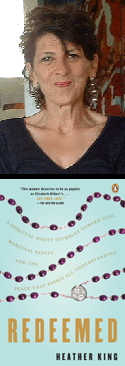 In her first book, Parched, Heather King documents twenty years of worshipping alcohol to the point, as she says, she was “willing to sacrifice everything: career, family, money, health, reputation, my life, and what is far worse than any of those, my soul, for alcohol.” Her second book Redeemed – A Spiritual Misfit Stumbles toward God,… READ MORE >
In her first book, Parched, Heather King documents twenty years of worshipping alcohol to the point, as she says, she was “willing to sacrifice everything: career, family, money, health, reputation, my life, and what is far worse than any of those, my soul, for alcohol.” Her second book Redeemed – A Spiritual Misfit Stumbles toward God,… READ MORE >
Reviews > Books
Burgeoning Beats
 A legendary manuscript co-written by Beat Masters, Jack Kerouac and William S. Burroughs, has finally come to light as And the Hippos Were Boiled in Their Tanks. Written when both were unknown and unpublished, leading hardscrabble lives in wartime New York, the real-life story centers on the doomed relationship between Lucien Carr and… READ MORE >
A legendary manuscript co-written by Beat Masters, Jack Kerouac and William S. Burroughs, has finally come to light as And the Hippos Were Boiled in Their Tanks. Written when both were unknown and unpublished, leading hardscrabble lives in wartime New York, the real-life story centers on the doomed relationship between Lucien Carr and… READ MORE >
Reviews > Books
A Hipster’s Homily
 Chuck Klosterman acquits himself well with his first novel, Downtown Owl. He’s better known as a wiseass essayist on movies, video games, heavy-metal music and pop culture miscellany for publications like Esquire, Spin, and The Guardian. An ominous news clipping prefaces Downtown Owl, reporting on a vicious blizzard that claimed the… READ MORE >
Chuck Klosterman acquits himself well with his first novel, Downtown Owl. He’s better known as a wiseass essayist on movies, video games, heavy-metal music and pop culture miscellany for publications like Esquire, Spin, and The Guardian. An ominous news clipping prefaces Downtown Owl, reporting on a vicious blizzard that claimed the… READ MORE >
Reviews > Books
Rushdie, The Enchanter
 In 1988, Sir Salman Rushdie’s Satanic Verses earned the Indian-British author a rare honor: a fatwa calling for Rushdie’s assassination, issued by a faction of Muslim extremists. The fatwa granted Rushdie the social distinction of martyrdom without its one significant disadvantage, as the author continued to collect awards and… READ MORE >
In 1988, Sir Salman Rushdie’s Satanic Verses earned the Indian-British author a rare honor: a fatwa calling for Rushdie’s assassination, issued by a faction of Muslim extremists. The fatwa granted Rushdie the social distinction of martyrdom without its one significant disadvantage, as the author continued to collect awards and… READ MORE >
Reviews > Books
Disasters of War
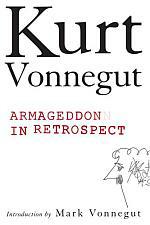 So here we are, facing a global economic collapse and an election where both candidates represent the lesser of another evil. It’s time to turn to Kurt Vonnegut, whose unique blend of bleak humor, genuine outrage, and dark surreality seems more relevant than ever, and more cogent than a cadre of political and economic analysts. Armageddon… READ MORE >
So here we are, facing a global economic collapse and an election where both candidates represent the lesser of another evil. It’s time to turn to Kurt Vonnegut, whose unique blend of bleak humor, genuine outrage, and dark surreality seems more relevant than ever, and more cogent than a cadre of political and economic analysts. Armageddon… READ MORE >
Opinion > Books
The Archbishop of Canterbury Reads Dostoevsky
 Rowan Williams, Archbishop of Canterbury, has recently written a book about Fyodor Dostoevsky, author of Crime and Punishment and The Brothers Karamazov. The book—Dostoevsky: Language, Faith, and Fiction—has drawn some controversy, not so much for its content, but for the question of whether it should have been written in the first place.… READ MORE >
Rowan Williams, Archbishop of Canterbury, has recently written a book about Fyodor Dostoevsky, author of Crime and Punishment and The Brothers Karamazov. The book—Dostoevsky: Language, Faith, and Fiction—has drawn some controversy, not so much for its content, but for the question of whether it should have been written in the first place.… READ MORE >
Reviews > Books
The Same Man?
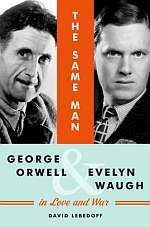 I suspect that the title of this little dual biography was intended to produce in the potential reader (i.e., anyone even a little familiar with Waugh and Orwell) precisely the reaction it produced in me upon hearing it: I exclaimed something to the effect of, “Say what?” and promptly plunked down twenty-six bucks (minus my local indie… READ MORE >
I suspect that the title of this little dual biography was intended to produce in the potential reader (i.e., anyone even a little familiar with Waugh and Orwell) precisely the reaction it produced in me upon hearing it: I exclaimed something to the effect of, “Say what?” and promptly plunked down twenty-six bucks (minus my local indie… READ MORE >
Reviews > Books
Roth’s Wrath
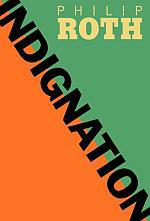 It’s not quite a twist on the level of The Sixth Sense (I read dead people?), but you may raise an eyebrow fifty-or-so pages into Indignation: our narrator is not only unreliable, he may not be corporeal. Philip Roth’s idea of the Afterlife is apparently similar to his idea of Old Age: mourn lost youth, nurse grudges, and rage… READ MORE >
It’s not quite a twist on the level of The Sixth Sense (I read dead people?), but you may raise an eyebrow fifty-or-so pages into Indignation: our narrator is not only unreliable, he may not be corporeal. Philip Roth’s idea of the Afterlife is apparently similar to his idea of Old Age: mourn lost youth, nurse grudges, and rage… READ MORE >
Reviews > Books
How to avoid the next war
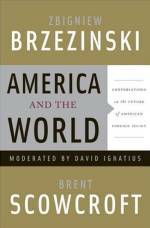 If you’re concerned about where Republican fear-mongering on the war on terror might lead us, don’t turn to the Democrats, who when it counted caved in to Bush on the Iraq War (and now mostly echo McCain/Palin’s position on the Middle East). Instead, go to clear-eyed foreign policy realists like Brent Scowcroft and Zbigniew Brzezinski… READ MORE >
If you’re concerned about where Republican fear-mongering on the war on terror might lead us, don’t turn to the Democrats, who when it counted caved in to Bush on the Iraq War (and now mostly echo McCain/Palin’s position on the Middle East). Instead, go to clear-eyed foreign policy realists like Brent Scowcroft and Zbigniew Brzezinski… READ MORE >
Reviews > Books
Twice-told Tales
 Our Story Begins collects new and older short-stories by Tobias Wolff, one of America’s acknowledged masters of the genre. Wolff-hounds will recognize canonical works like “Hunters in the Snow,” “Bullet in the Brain,” and “In the Garden of the North American Martyrs,” short-form masterpieces that have… READ MORE >
Our Story Begins collects new and older short-stories by Tobias Wolff, one of America’s acknowledged masters of the genre. Wolff-hounds will recognize canonical works like “Hunters in the Snow,” “Bullet in the Brain,” and “In the Garden of the North American Martyrs,” short-form masterpieces that have… READ MORE >
Reviews > Books
Paul Auster, In the Dark
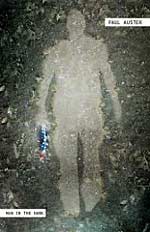 In Paul Auster’s new novel, the ‘Man in the Dark’ is August Brill, a retired book critic with a broken leg, a broken heart, and a serious bout of insomnia. Lacking the season of all natures, sleep, Brill endures an endless cycle of dark nights of the soul by making up escapist stories in his head, an activity that dampens his… READ MORE >
In Paul Auster’s new novel, the ‘Man in the Dark’ is August Brill, a retired book critic with a broken leg, a broken heart, and a serious bout of insomnia. Lacking the season of all natures, sleep, Brill endures an endless cycle of dark nights of the soul by making up escapist stories in his head, an activity that dampens his… READ MORE >
Reviews > Books
Holy Man: What does the Dalai Lama actually stand for?
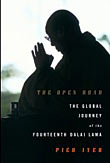 “’The more he gave himself to the world,’ Iyer writes, the more Tibetans have come to feel ‘like natural children bewildered by the fact that their father has adopted three others.’ …Avidly embracing the liberating ideas of the secular metropolis, the Dalai Lama resembles the two emblematic types who have shaped the modern age, for better and for worse—the provincial fleeing ossified custom and the refugee fleeing totalitarianism. Even so, his critics may have a point: the Dalai Lama’s citizenship in the global cosmopolis seems to come at a cost to his dispossessed people… It is hard to see the Dalai Lama bringing about mutual understanding in the world at large when he has failed to bring it about between China and Tibet.” READ MORE >
“’The more he gave himself to the world,’ Iyer writes, the more Tibetans have come to feel ‘like natural children bewildered by the fact that their father has adopted three others.’ …Avidly embracing the liberating ideas of the secular metropolis, the Dalai Lama resembles the two emblematic types who have shaped the modern age, for better and for worse—the provincial fleeing ossified custom and the refugee fleeing totalitarianism. Even so, his critics may have a point: the Dalai Lama’s citizenship in the global cosmopolis seems to come at a cost to his dispossessed people… It is hard to see the Dalai Lama bringing about mutual understanding in the world at large when he has failed to bring it about between China and Tibet.” READ MORE >
Reviews > Books
Sleepy-Eyed Writer, Wandering Byzantium
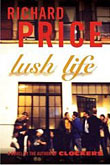 “About the Lower East Side today,’ Mr. Price said, ‘This place is like Byzantium. It’s tomorrow, yesterday — anyplace but today.’ ... ‘Lush Life’ took so long to finish, he said, in part because he spent so much time researching it — talking to people, riding around with the neighborhood police and sometimes just walking around. ‘I always like to hang out,’ he said, ‘because, one, it’s a way of avoiding really writing; and, two, sometimes God is a crackerjack novelist and you can plagiarize the hell out of him.’ He particularly liked hanging out with cops, he said, ‘because I’m so not a cop myself. Being with them gets me out of my own self-consciousness.’” READ MORE >
“About the Lower East Side today,’ Mr. Price said, ‘This place is like Byzantium. It’s tomorrow, yesterday — anyplace but today.’ ... ‘Lush Life’ took so long to finish, he said, in part because he spent so much time researching it — talking to people, riding around with the neighborhood police and sometimes just walking around. ‘I always like to hang out,’ he said, ‘because, one, it’s a way of avoiding really writing; and, two, sometimes God is a crackerjack novelist and you can plagiarize the hell out of him.’ He particularly liked hanging out with cops, he said, ‘because I’m so not a cop myself. Being with them gets me out of my own self-consciousness.’” READ MORE >
Reviews > Books
Christ the Lord: The Road to Cana
 “Far from pushing boundaries, or the church's buttons, Rice's portrayal of Jesus as the son of God and the savior of humankind is theologically sound. At the same time, he's also very human, with needs and cares readers can relate to. ‘It's an attempt to get close to him and what he experienced, to make it historically exciting and historically correct,’ she said. Writing the books ‘has made me conscious of what (Jesus) suffered in the way of derision and dismissal … Just like today -- people go around making jokes about him. But he goes right on winning souls no matter what anybody does. We've come 2,000 years, and you can still sit at his feet and hear him speak and feel his hand, maybe, touch your shoulder. He survives it all.’" READ MORE >
“Far from pushing boundaries, or the church's buttons, Rice's portrayal of Jesus as the son of God and the savior of humankind is theologically sound. At the same time, he's also very human, with needs and cares readers can relate to. ‘It's an attempt to get close to him and what he experienced, to make it historically exciting and historically correct,’ she said. Writing the books ‘has made me conscious of what (Jesus) suffered in the way of derision and dismissal … Just like today -- people go around making jokes about him. But he goes right on winning souls no matter what anybody does. We've come 2,000 years, and you can still sit at his feet and hear him speak and feel his hand, maybe, touch your shoulder. He survives it all.’" READ MORE >
Reviews > Books
The Last Triumph of Fatima
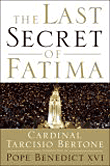 The centrality of Fatima to the second, ‘suffering servant’ stage of John Paul II's papacy, and his involvement with the two men who would become the Vatican's numbers one and two after his death, may help explain why Lucia's cause has been fast-tracked for beatification... In the book, Bertone seems relieved that all the Virgin's prophecies were now safely in the past tense, and could no longer be seen as portending the world's end: ‘It's all quite different from the massive carnage certain fevered brains like to imagine taking place,’ he writes… READ MORE >
The centrality of Fatima to the second, ‘suffering servant’ stage of John Paul II's papacy, and his involvement with the two men who would become the Vatican's numbers one and two after his death, may help explain why Lucia's cause has been fast-tracked for beatification... In the book, Bertone seems relieved that all the Virgin's prophecies were now safely in the past tense, and could no longer be seen as portending the world's end: ‘It's all quite different from the massive carnage certain fevered brains like to imagine taking place,’ he writes… READ MORE >
Reviews > Books
The Advantages of Closing a Few Doors
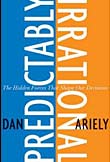 …Dan Ariely’s new book, ‘Predictably Irrational,’ an entertaining look at human foibles like the penchant for keeping too many options open. “Closing a door on an option is experienced as a loss, and people are willing to pay a price to avoid the emotion of loss,” Dr. Ariely says… So what can be done? One answer, he says, is to develop more social checks on overbooking. He points to marriage as an example: ‘In marriage, we create a situation where we promise ourselves not to keep options open. We close doors and announce to others we’ve closed doors.’” READ MORE >
…Dan Ariely’s new book, ‘Predictably Irrational,’ an entertaining look at human foibles like the penchant for keeping too many options open. “Closing a door on an option is experienced as a loss, and people are willing to pay a price to avoid the emotion of loss,” Dr. Ariely says… So what can be done? One answer, he says, is to develop more social checks on overbooking. He points to marriage as an example: ‘In marriage, we create a situation where we promise ourselves not to keep options open. We close doors and announce to others we’ve closed doors.’” READ MORE >
Reviews > Books
After the Apocalypse
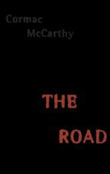 “As they travel the father feeds his son a story, the nearest that he can come to a creed or a reason to keep on going: that he and his son are ‘carrying the fire.’ …the boy seems to intuit a promise: that life will not always be thus; that it will improve, that beauty and purpose, sunlight and green plenty will return; in short that everything is going to be ‘okay,’ a word which both characters endlessly repeat to each other, touching it compulsively like a sore place or a missing tooth. They are carrying the fire through a world destroyed by fire, and therefore—a leap of logic or faith that by the time the novel opens has become almost insurmountable for both of them—the boy must struggle on, so that he can be present at, or somehow contribute to, the eventual rebirth of the world.” READ MORE >
“As they travel the father feeds his son a story, the nearest that he can come to a creed or a reason to keep on going: that he and his son are ‘carrying the fire.’ …the boy seems to intuit a promise: that life will not always be thus; that it will improve, that beauty and purpose, sunlight and green plenty will return; in short that everything is going to be ‘okay,’ a word which both characters endlessly repeat to each other, touching it compulsively like a sore place or a missing tooth. They are carrying the fire through a world destroyed by fire, and therefore—a leap of logic or faith that by the time the novel opens has become almost insurmountable for both of them—the boy must struggle on, so that he can be present at, or somehow contribute to, the eventual rebirth of the world.” READ MORE >
Reviews > Books
Dumb and Dumber: Are Americans Hostile to Knowledge?
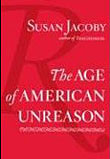 “Ms. Jacoby doesn’t expect to revolutionize the nation’s educational system or cause millions of Americans to switch off ‘American Idol’ and pick up Schopenhauer. But she would like to start a conversation about why the United States seems particularly vulnerable to such a virulent strain of anti-intellectualism… Avoiding the liberal or conservative label in this particular argument, she prefers to call herself a ‘cultural conservationist.’” READ MORE >
“Ms. Jacoby doesn’t expect to revolutionize the nation’s educational system or cause millions of Americans to switch off ‘American Idol’ and pick up Schopenhauer. But she would like to start a conversation about why the United States seems particularly vulnerable to such a virulent strain of anti-intellectualism… Avoiding the liberal or conservative label in this particular argument, she prefers to call herself a ‘cultural conservationist.’” READ MORE >
Reviews > Books
Death’s Army
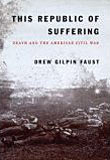 “Americans had never endured anything like the losses they suffered between 1861 and 1865 and have experienced nothing like them since." The author writes: “’The work of death was Civil War America’s most fundamental and most demanding undertaking.’ Her account of how that work was done, much of it gleaned from the letters of those who found themselves forced to do it, is too richly detailed and covers too much ground to be summarized easily. She overlooks nothing — from the unsettling enthusiasm some men showed for killing to the near-universal struggle for an answer to the question posed by the Confederate poet Sidney Lanier: ‘How does God have the heart to allow it?’” READ MORE >
“Americans had never endured anything like the losses they suffered between 1861 and 1865 and have experienced nothing like them since." The author writes: “’The work of death was Civil War America’s most fundamental and most demanding undertaking.’ Her account of how that work was done, much of it gleaned from the letters of those who found themselves forced to do it, is too richly detailed and covers too much ground to be summarized easily. She overlooks nothing — from the unsettling enthusiasm some men showed for killing to the near-universal struggle for an answer to the question posed by the Confederate poet Sidney Lanier: ‘How does God have the heart to allow it?’” READ MORE >
Reviews > Books
The Dawkins Confusion
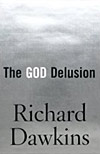 “The God Delusion is full of bluster and bombast, but it really doesn’t give even the slightest reason for thinking belief in God mistaken, let alone a ‘delusion.’ Dawkins seems to have chosen God as his sworn enemy. (Let’s hope for Dawkins’ sake God doesn’t return the compliment.)... You might say… READ MORE >
“The God Delusion is full of bluster and bombast, but it really doesn’t give even the slightest reason for thinking belief in God mistaken, let alone a ‘delusion.’ Dawkins seems to have chosen God as his sworn enemy. (Let’s hope for Dawkins’ sake God doesn’t return the compliment.)... You might say… READ MORE >
Page 1 of 1 pages







